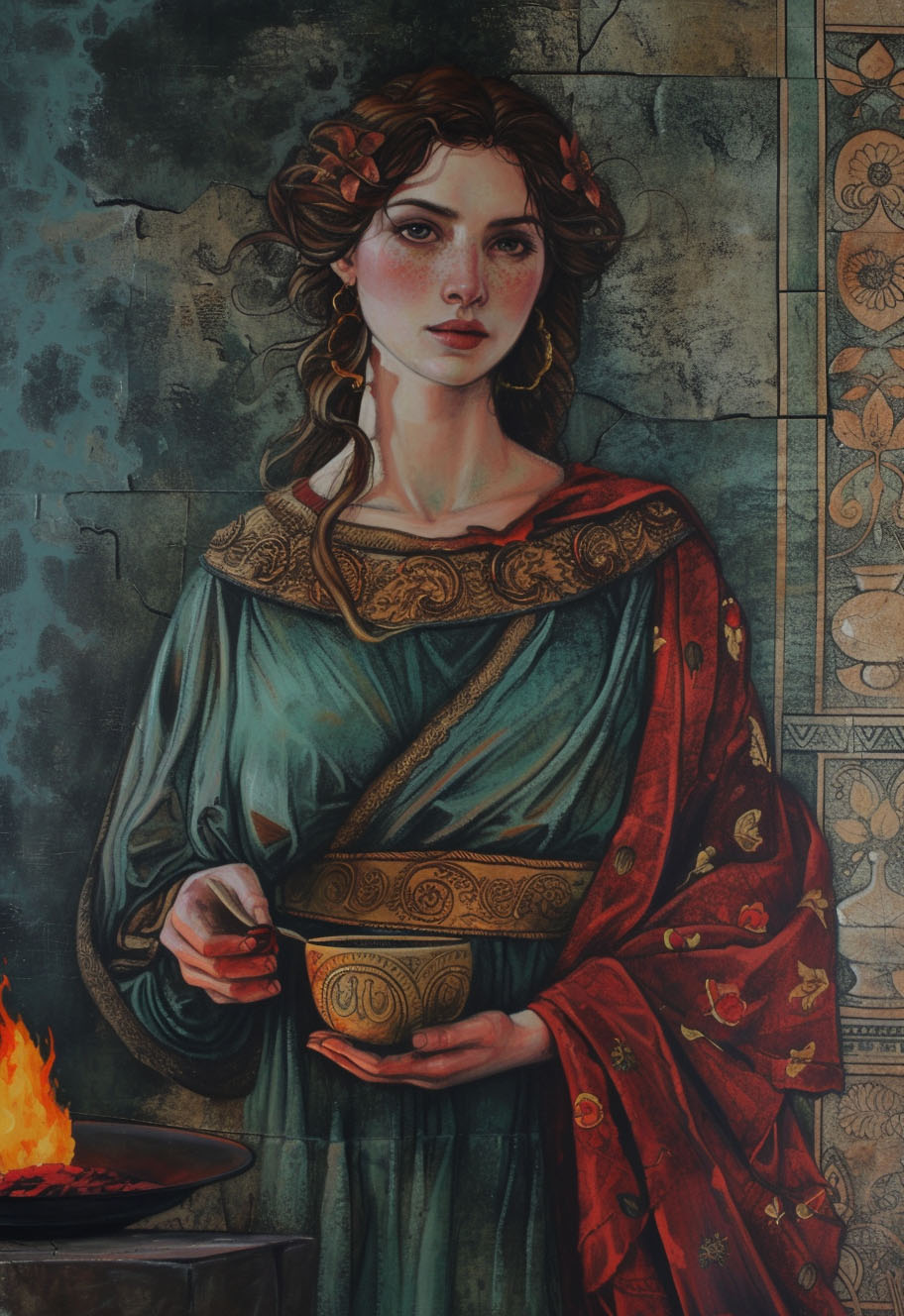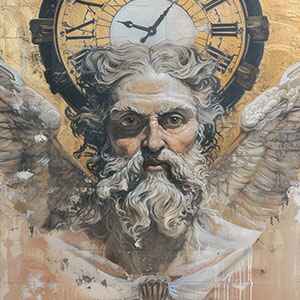Hestia
In Greek mythology, Hestia is a virgin goddess and one of the twelve Olympian deities. She is associated with the hearth, home, and the sacred fire. Here are key aspects of Hestia in Greek mythology:
Parents: Cronus & Rhea
Siblings: Zeus, Hera, Poseidon, Hades, and Demeter
Consort: Not applicable
Children: Not applicable

Virgin Goddess: Hestia is one of the virgin goddesses in the Greek pantheon. She is often depicted as modest and gentle, and she took a vow of eternal chastity.
Family Relations: Hestia is the daughter of Cronus and Rhea, making her one of the siblings of Zeus, Hera, Poseidon, Hades, and Demeter. In some traditions, Hestia is considered the firstborn among the siblings.
Hearth and Home: Hestia's primary domain is the hearth, which symbolizes the center of the home and the sacred fire that was kept burning in ancient households. The hearth was seen as the focal point of family life and communal gatherings.
Cult of Hestia: Hestia was highly revered in ancient Greek society, and her worship was deeply ingrained in the domestic rituals of households. The hearth fire tended to by the matron of the household was considered sacred, and Hestia was invoked at the beginning and end of communal meals and gatherings.
Role in the Pantheon: Despite being one of the Twelve Olympians, Hestia did not actively participate in the conflicts or disputes among the gods. Her presence was associated with maintaining harmony and stability within the family and community.
Olympian Status: Hestia gave up her seat among the Olympian gods to Dionysus. In some accounts, she willingly stepped aside to avoid any potential conflicts or rivalries among the gods. As a result, Dionysus became one of the Twelve Olympians in her place.
Mythological Stories: Hestia does not figure prominently in many myths, as her role is more domestic and focused on the hearth. Her presence is often implied rather than explicitly narrated.
Symbols: Symbols associated with Hestia include the hearth, the sacred fire, and the kettle. Her depictions emphasize a serene and dignified demeanor.
Vestal Virgins: In Roman culture, there were priestesses known as the Vestal Virgins who served the goddess Vesta, the Roman counterpart of Hestia. Like Hestia, the Vestal Virgins tended to the sacred fire in the Roman Forum.
Eternal Flame: The concept of the "eternal flame" or "sacred flame" in various religious and cultural traditions is reminiscent of the symbolic importance of the hearth and the perpetually burning fire associated with Hestia.
Hestia's significance lies in her role as the guardian of the hearth, symbolizing warmth, stability, and the center of home life. While she may not have played a central role in myths, her worship and the rituals associated with the hearth held great importance in ancient Greek culture.
Immediate Family
Quick Facts
- She is one of the virgin goddesses.
- Her primary domain is the hearth and home.
- Hestia gave up her seat among the Olympian gods to Dionysus.
- She is associated with symbols like the hearth, sacred fire, and the kettle.
- Hestia's worship was deeply ingrained in domestic rituals.
Further Reading
Art &
Architecture
Ancient Greek art and architecture, with its harmonious proportions and timeless elegance, continue to inspire awe and admiration millennia later.
Discover
Greek Mythology & Mythical Characters
Greek mythology, a rich tapestry of gods, heroes, and mythical creatures, captivates the imagination with its tales of love, betrayal, and epic adventures that delve into the depths of the human psyche.
Discover
Ancient Greek History
Ancient Greek history, marked by remarkable achievements in democracy, philosophy, and warfare, shaped the foundation of Western civilization, leaving an indelible legacy of innovation and cultural influence that continues to resonate to this day.
Discover
Ancient Greek Olympics
The ancient Greek Olympics, held in Olympia every four years, celebrated athleticism, unity, and cultural pride, serving as a testament to the enduring spirit of competition and excellence that transcends time and borders.
Discover
Ancient Greek Wars
Ancient Greek wars, such as the Persian Wars and the Peloponnesian War, were pivotal conflicts that shaped the course of history, highlighting the struggle for power, independence, and the clash of civilizations in the ancient Mediterranean world.
Discover
Ancient Greek Culture and Society
Ancient Greek culture and society, characterized by its emphasis on art, philosophy, and civic engagement, fostered a vibrant intellectual and social landscape where innovation flourished, democracy thrived, and the pursuit of knowledge and excellence was celebrated as fundamental values of civilized life.
Discover

